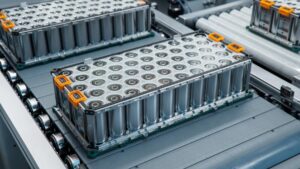Exciting Developments for Pure Lithium: $300 Million Commitment from EXIM Bank
Pure Lithium, a leader in innovative battery technology, is making headlines with a recently announced letter of interest (LOI) from the Export-Import Bank of the United States (EXIM). This LOI signifies potential debt funding of up to $300 million aimed at establishing the company’s first industrial-scale lithium metal vanadium battery manufacturing facility. This milestone project speaks volumes about the strategic shifts happening in the American lithium and battery manufacturing sectors.
Fueling America’s Energy Storage Revolution
The funding package, characterized by a 12-year repayment term, is bolstered by EXIM’s "Make More in America" initiative. This initiative not only emphasizes financial support but also focuses on revitalizing American manufacturing and promoting exports. By fostering domestic production capabilities, this initiative aligns with the growing urgency for sustainable energy solutions and enhances job creation within the sector.
It’s crucial to note that EXIM will perform extensive due diligence once Pure Lithium submits a formal financing application. This thorough evaluation will determine the project’s viability and feasibility for a final commitment, highlighting the meticulous nature of financial backing in this transformative industry.
The Bigger Picture: Aligning with National Interests
Pure Lithium’s CEO, Emilie Bodoin, articulated the significance of this undertaking, stating, “This project will be very impactful for US manufacturing in the crucial sector of energy storage.” The company’s groundbreaking Brine to Battery technology could revolutionize the U.S. battery supply chain from raw materials sourcing right through to the production of finished products. This move not only secures domestic battery production but also elevates the country’s energy and national security stance.
In a strategic response to global competition, the potential agreement may also qualify for special consideration under Section 402 of EXIM’s 2019 reauthorization. This directive empowers EXIM to address competitive pressures, particularly from nations like China, ensuring that the U.S. retains its leadership in essential and transformative export domains.
Understanding the China and Transformational Exports Program (CTEP)
The China and Transformational Exports Program (CTEP) is an instrumental part of EXIM aimed at supporting U.S. exporters against competitors from China. It entails benefits such as lower fees, extended repayment terms, and customized policies specifically designed for projects that predominantly involve U.S. content.
For Pure Lithium, the backing from programs like CTEP can be a game-changer in positioning the company favorably in the rapidly evolving global lithium market. Such strategic advantages could potentially position U.S. companies ahead of their Chinese counterparts, affecting not just sales but also technological advancement.
Already Making Strides in Sustainability
This announcement is not Pure Lithium’s first foray into government-supported funding. In March 2025, the company secured funding from the U.S. Department of Energy’s Vehicle Technology Office, aiming to create a closed-loop domestic supply chain for lithium metal anodes. This commitment to sustainability and innovation highlights Pure Lithium’s vision – not merely to join the lithium rush but to lead it responsibly and profitably, promoting a greener and more self-sufficient American economy.
In summary, Pure Lithium’s recent letter of interest from EXIM marks a critical juncture for the company and the broader U.S. battery manufacturing landscape. As we observe this evolving situation, it remains vital for investors and stakeholders alike to stay informed and consider the far-reaching implications of domestic battery production on energy independence, economic growth, and sustainable innovation.

